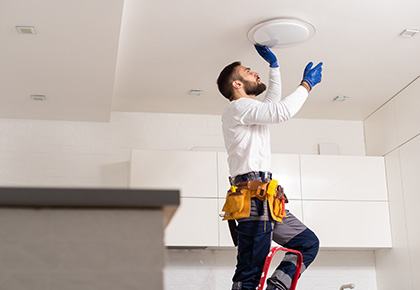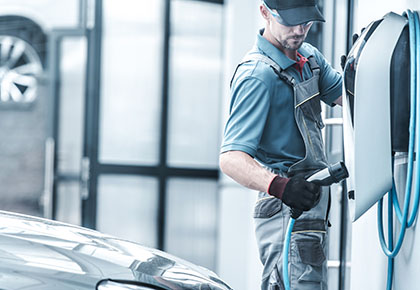-
When a Natural Disaster Strikes, Is Your Association Covered?
Hurricanes. Floods. Tornadoes. Hail. Wildfires. Lightning strikes. Earthquakes. Blizzards. Mother Nature has quite the arsenal to throw at us! Unfortunately, every part of North America is subject to one or more of these events. Some, like hurricanes, come with enough advance warning to prepare for them, but most do not. That’s why it is critical to the financial health of your community association to have the proper insurance coverage in place. -
News You Can Use: Flash Flood Safety Tips to Keep Your Family Safe
In many parts of the country, flash flood watches and/or flash flood warnings are often issued during torrential downpours, especially in hurricane-prone and/or low-lying areas. -
9 tips about board of directors conflicts of interest
It’s a term that gets tossed around quite a lot. But “conflict of interest” is a real and genuine threat to your association and its proper stewardship. Understanding what the term means – as well as how to recognize and avoid conflicts of interest– can go a long way toward ensuring the strength and stability of your community and eliminating many concerns. -
FirstService Residential Executive Discusses Offbeat Second Home Investment Locations and Trends
While exclusive communities like the Hamptons or Malibu will always be attractive locations for affluent vacation home buyers, several new trends are emerging in the growing second home market. -
Power Outages and Blackouts - How Your Association Can Minimize Risk
Losing power is never fun. But it’s bound to happen at some point, so preparation is the best defense. Obviously, different types of communities are affected by blackouts in different critical ways: high-rises lose their elevators and water; resort-style gated communities lose the ability to operate their gates. For residents, a blackout may be a short-term nuisance. For a community association, it can be a major headache in terms of risk management, safety and potential equipment damage that can provide an unwelcome shock to your budget. -
Why Preparation for This Hurricane Season is Important for Your Community
Is your community prepared to weather a storm? June 1st marks the beginning of the 2016 hurricane season running through November 30th. The National Weather Service reports that, of an average of 12 tropical storms that form over the Atlantic Ocean each year, six become hurricanes. In the Central Pacific, an average of three tropical storms form, with two escalating to full-blown hurricane status. Figures like these make hurricanes a very real threat for many communities and homeowners. In fact, 2016 promises to be anything but your average year. Let’s take a look at why you may want to approach this year in a way that’s as unique as the weather conditions themselves. -
Promoting Fire Safety in Your Community Association
Part of your job as a board member is ensuring the safety of residents in your community association. To that end, it’s important to educate homeowners about possible fire risks and the steps they can take to prevent fire hazards in their homes. Chances are that fire safety isn’t top of mind for residents. However, home fires are more common than most people realize. -
Pros and Cons of Do It Yourself Repairs and Maintenance
FirstService Residential's Bill Worrall discusses the hidden costs of DIY maintenance and repairs and provides great insight into how boards can determine what can be done in house and what should be subbed out to appropriate contractors. -
Put an Energy Saving Program Together for a Multifamily Property
Many HOAs and community associations would like to save energy and energy spending, but they think that putting an energy management plan into place for their multifamily property is difficult to accomplish. FS Energy's Chris Normandeau explains some basic, easy-to-do steps that can make a real impact on an association's energy usage and budget. -
5 Steps to the Best Reserve Study Firm
In our guide to capital improvements , reserve studies and their relationship to capital improvements and preventive maintenance were discussed at length. -
Seven Tips to Finding a Reserve Study Firm
Your reserve fund is what helps your association anticipate its future– and budget for it, too. This fund gives you the power to maintain the quality of your community by allowing for projects that are both necessary and expensive (like a future roofing or paving project, for instance). -
Seven Ways to Fight Mold - And Win
It’s the scourge of households everywhere: the unsightly, unsanitary, unbecoming sight of mold. But waging war on mold means more than launching a full-scale assault when you see it (though that can be part of the battle plan). Instead, consider a comprehensive strategy – here are some tips to help you get started and steer clear of mold. -

5 strategies for energy conservation in community associations
In this article, we delve into the significance of energy conservation within community associations, exploring its benefits and strategies for effective implementation. -
Simple Energy Conservation Steps to Benefit Your Community This Winter
So what can condo boards or community associations do to mitigate or even reduce costs this winter? Let’s start with what you can do in the summer and fall, before winter actually begins. This includes cleaning, tuning and performing any necessary repairs to heating systems, furnaces and boilers to make sure they won’t be working longer, harder or less efficiently than they should. Other pre-winter tasks include cleaning gutters to remove leaves and debris to ensure water can flow freely. Otherwise, water can become trapped and freeze, which can not only damage your property’s gutters, but also cause ice dams and possible roof leaks. -
Simple Landscaping Tips To Help You Prepare for Storm Season
For most of us, storm season means prepping our residences to mitigate potential damage caused by high winds and heavy rains. But there’s a part of our homes and neighborhoods we often overlook – sometimes with disastrous results. That often-forgotten place is right outside your front door: it’s your landscaping. -

Six steps to implement EV charging in high-rise condos
No longer the products of science fiction fantasy, electric cars are now a reality of everyday life. While the reduced emissions of personal electric vehicles, or PEVs, are good news for the environment, their charging requirements may create challenges for condo associations trying to navigate their infrastructure requirements, legal implications, management concerns and even aesthetic considerations. -
Six Things to Know About Fire Hydrants
Aside from knowing to not park next to one, how deep is your knowledge of fire hydrants? Unless you’re a firefighter, it’s probably not that extensive. This may not be a problem... until the unthinkable happens and you need to be confident that your fire hydrants are in good working order. But like any equipment in your community, fire hydrants need to be maintained. -
Slow and Steady: 5 Surprising Benefits of Raising Dues
It’s that time of year again – budget season is upon us. You know the steps to creating your budget, but what drives your process? -
The Surprising Way to Stretch Your Association's Dollars
If you’re on the board of a condo, co-op, high-rise or HOA, you know that managing your community’s budget is a major priority. You’ve likely explored many ways to save money and get the best deals, while still maintaining a high level of service. -
3 common residential drainage problems and their solutions
Unless you live in an area where it hardly ever rains (in which case you have a whole other set of problems), drainage will be an issue in your community. Proper drainage is, of course, the answer, but getting there means you have to meet stringent requirements throughout different areas of your community. -
Tips for Eco-Friendly High-Rise Living: Living Sustainably in the City
Many multifamily properties and high-rises want to implement “green” living practices and create eco-friendly communities, but not everyone knows where nor how to get started. Here are some effective and easy tips to help you be proactive and successful in achieving your sustainability goals. Read on for a list of programs and services that can be put in place in your community at little to no cost. -
Tips for getting a mortgage
We’ve got the scoop on how to get a mortgage loan, so read on for our top six tips to increase your chances. -
Tips to Help Your HOA Winterize Your Community
It’s that time of year again – there’s a noticeable nip in the air, trees are losing their leaves and stores are starting to display their holiday swag. That can only mean one thing – winter is right around the corner. If your HOA is located in an area affected by wintry weather, we probably don’t need to remind you about last year’s Arctic-level freeze. Some of the coldest-ever temperatures were recorded in many parts of the country – and if you heed the predictions in the Old Farmer’s Almanac , you know that this year promises to be even more frigid. Is your community prepared to handle the upcoming chill? Here are some tips to help your homeowners association winterize your community, no matter what surprises the season may bring. -
Tips to Help Your Homeowners Association Organize a Community Recycling Program
Is your homeowners association considering starting a recycling program for your community? If so, bravo! Take a look at some of the benefits: conserving energy, saving water, preserving resources, reducing air pollution and saving landfill space. And did you know that in addition to helping the environment, recycling can also provide economic benefits as well? To get you started, here are some tips and considerations to help your association plan and implement a successful recycling program for your community.